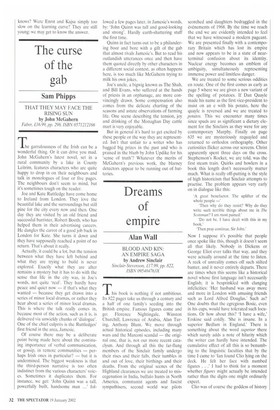The curse of the gab
Sam Phipps
THAT THEY MAY FACE THE RISING SUN by John McGahern Faber, £16.99, pp. 298, ISBN 0571212166 he garrulousness of the Irish can be a wonderful thing. Or it can drive you mad. John McGahern's latest novel, set in a rural community by a lake in County Leitrim, features characters who are quite happy to drop in on their neighbours and talk in monologues of four or five pages. The neighbours don't seem to mind, but it's sometimes tough on the reader.
Joe and Kate Ruttledge have come home to Ireland from London. They love the beautiful lake and the surroundings but still pine for the city every now and then. One day they are visited by an old friend and successful barrister, Robert Booth, who has helped them in their advertising careers. He dangles the carrot of a good job back in London for Kate. She turns it down and they have supposedly reached a point of no return. That's about it really.
Actually, it could be a lot, but the tension between what they have left behind and what they are trying to build is never explored. Exactly what they are after remains a mystery but it has to do with the sense that life in the city was, in Joe's words, not quite 'real'. They hardly have peace and quiet now — if that's what they wanted — because they get drawn into a series of minor local dramas, or rather they hear about a series of minor local dramas. This is where the talk really comes in, because most of the action, such as it is, is delivered via unwieldy chunks of 'dialogue'. One of the chief culprits is the Ruffledges' first friend in the area, Jamesie.
Of course there may be a deliberate point being made here about the continuing importance of verbal communication, or gossip, in remote communities — perhaps Irish ones in particular? — but it is undermined. The biggest weakness is that the third-person narrative is too often indistinct from the various characters' voices. Sometimes it duplicates them. For instance, we get: 'John Quinn was a tall, powerfully built, handsome man ...' fol
lowed a few pages later, in Jamesie's words, by: 'John Quinn was tall and good-looking and strong'. Hardly earth-shattering stuff the first time.
Quinn in fact turns out to be a philandering boor and bore with a gift of the gab that almost rivals Jamesie's. But to read his outlandish utterances once and then have them quoted directly by other characters in a different social context, as often happens here, is too much like McGahern trying to milk his own jokes.
Joe's uncle, a bigwig known as The Shah, and Bill Evans, who suffered at the hands of priests in an orphanage, are more convincingly drawn. Some compensation also comes from the delicate charting of the seasons and astute observations of farming life. One scene describing the tension, joy and drinking of the Monaghan Day cattle mart is very enjoyable.
But in general it's hard to get excited by these people or the way they are represented. Isn't that unfair to a writer who has bagged big prizes in the past and who is praised in the blurb by John Updike for his 'sense of truth'? Whatever the merits of McGahern's previous work, the blarney detectors appear to be running out of batteries.






























































 Previous page
Previous page